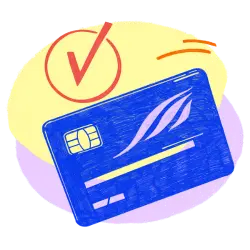TABLE OF CONTENTS
The various terms, options, and even company names on credit cards can be downright confusing to the average business owner and cardholder. While you may already be familiar with industry-leading names like Visa, Mastercard, American Express, and Discover, you may not know that these credit card companies are not necessarily issuing your cards.
Who exactly is issuing your credit card? Let’s break it down.
What is a Credit Card Issuer?
The term “credit card issuer” refers to the bank issuing the credit card. Credit card issuers may also be referred to as the “issuing bank” or “credit card company.” Credit card issuers are banks or credit unions that supply credit cards directly to users. The users can be consumers or businesses.
In the United States, many debit and credit card issuers also operate as major banks. These include American Express, Chase, Capital One, Discover, Bank of America, Barclaycard, Citi, and US Bank. There are also large credit unions that are credit card issuers, as well as hundreds of local and regional banks and credit unions that issue credit cards directly to consumers and business owners.

How do credit card issuers work?
Credit card issuers manage the transactions between cardholders and their accounts. Issuers are responsible for the following:
- Approving or denying credit card applications
- Setting credit limits, APRs, terms, and most of the associated benefits
- Paying transactions on behalf of the cardholders
- Collecting payments from cardholders
- Proving customer service to cardholders
Issuers review applications, mail and activate credit cards, issue statements, and process the various payments associated with every card. Additionally, many credit card issuers offer benefits or rewards to users. Card issuers may also report users’ payment history, as well as other information, to the credit bureaus. This is one of the major benefits of having a business credit card, as such reporting helps boost your business’ credit score. The benefits and rewards can be another major benefit of a business credit card, especially if you target your business’ chief expenses. For example, a credit card offering airline, hotel, or other travel rewards would most benefit a business in which extensive traveling is required to execute its goals.
Issuers accept a level of risk due to approving or declining applications, as well as setting each cardholder’s credit limit.
Credit card co-brand partners

It can feel as though everywhere you shop, it offers credit cards to loyal customers. In today’s market, many credit cards have co-branded partners. These partners may be retailers, airlines, hotels, or other businesses offering exclusive rewards and perks to anyone who signs up and is approved for their credit card.
These cards tend to highlight the name of the co-branded partner much more so than the card issuer. Because of this practice, many card users may confuse the partner for the issuer. That confusion can be stifled here and now, as airlines, hotels, and stores do not issue credit cards on their own. Their advertised credit cards are always issued by a partnering bank or credit union. The card may only indicate the issuer in small print on the back of the card, but it’ll always be located somewhere on the card.
This is vital information for users experiencing problems with their credit cards. The card owner needs to contact the credit card issuer, not the co-branded partner. However, some issues with the rewards program are best resolved by contacting the co-branded partner, not the card issuer.

Why a credit card issuer may change
Cardholders may experience an instance in which they’re notified that their credit card issuer has changed. Card owners that undergo a change in issuer will receive a new account number because the credit line has been transferred to a new bank.
There may also be a change in associated benefits for the card member. Rewards points may be transferred to the new account, or the cardholder may need to redeem accumulated rewards points with the previous credit card issuer.
Credit card issuer changes are most common among credit cards with co-branded partners. The partners enter into agreements with banks to issue co-branded cards. A change in issuer happens when these agreements are renegotiated, sold, or transitioned to a new credit card issuer.
Cardholders who experience a change in issuer for an active credit card will receive a new credit card. They will also need to change recurring bill payments, set up new auto payments, and activate their new cards. Users may also want to download old statements and review any changes to their cards. Downloading old statements can be of particular importance for business credit cardholders in the case of a financial audit.

How much do credit card issuers charge?
Credit card issuers set the interest rates and associated fees. Interest rates and fees are how issuers make a profit from their ongoing contracts with consumers. In addition, credit card issuers collect credit card processing fees from merchants on a percentage of sales at the businesses in which their credit card is used for payment. Fees and interest rates vary among individual cards and credit card issuers.
List of Credit Card Issuers in the US
In the U.S., business owners and consumers have a long list of credit card issuers to choose from, but the industry leaders are:
- American Express
- Bank of America
- Barclays
- Capital One
- Chase
- Citi Bank
- Discover
- Synchrony
- USAA
- U.S. Bank
- Wells Fargo
What is a Credit Card Network

All credit cards operate under a payment network. You’re probably familiar with the names Visa, Mastercard, American Express, and Discover. They’re the leaders in the credit card payment processing network. These major companies operate as middlemen and process payments made by credit card to merchants. They’re responsible for the relationship between a card issuer and a merchant processor. The merchant processor is a company with which businesses must partner to accept credit card payments as a form of payment.
Payment networks may also partake in handling cardholder benefits, but this varies from card to card and types of benefits.

How do credit card payment networks work?
A payment network is responsible for the transaction process. The credit card issuer must agree to allow their cards to be used on a specific payment network, but they’re not involved in the process. For example, an American Express cardholder can’t pay at a merchant that doesn’t offer Amex payments unless the customer uses another form of payment.
Linking a payment network to a credit card issuer allows merchants and banks to work together. The merchant uses the bank’s credit card processing services through the payment network. Banks issue cards on the payment networks in which they have agreements with.

List of credit card networks
There are four major credit card networks:
- American Express
- Discover
- Mastercard
- Visa
Card Issuer vs Card Network:
Banks are responsible for issuing cards, but they may work with multiple card networks to process transactions. This allows banks to accept different kinds of credit cards through the payment network. For example, Visa offers both co-branded and general-purpose credit cards. Banks may choose to offer co-branded cards that link directly to a merchant, or they can issue General Purpose Cards that work with any payment network.

The Differences between American Express, Mastercard, Discover, and Visa
American Express and Discover operate as card issuers and payment networks. However, a card may be part of the American Express or Discover payment network but have a different issuer. When a cardholder is aware of the issuer, payment network, and co-brand partner, they’ll better know who to contact to address any issues that arise with their credit card.
Visa and Mastercard do not directly issue credit cards but do so through member financial institutions. However, this doesn’t mean they’re the low players on the totem pole. Visa and Mastercard are the world’s top credit card payment processing networks, beating out American Express and Discover.
Which credit card network and issuer is right for you?
The four major credit card networks are largely accepted by most retailers, but cardholders may experience instances where merchants do not accept credit cards from certain networks. Merchants have a choice as to what forms of payment they accept. Just like businesses can choose to be cash-only or refuse personal checks, they may also specify which consumer cards can provide payment.
Cardholders who have credit cards from multiple networks have a sense of security in the usability department. In fact, cardholders with a card from each major network can feel safe that no matter where they shop, one of their cards will be able to cover the transaction.
When it comes to global acceptance for those who shop or travel outside of the US, Mastercard and Visa are most widely accepted. Internationally, American Express and Discover have lower acceptance rates. In searching for the best credit card for your business needs, keep this in mind if your business requires a lot of international travel.
The payment processing network associated with the card doesn’t determine the interest rates or the rewards, whether they be points or cashback. Instead, these specifics are determined by the credit card issuer and possible co-brand partner. However, the processing network may have other benefits, such as payment protection, fraud protection, and specified perks like vehicle rental insurance.
You are advised to check your or your business’ credit score to determine which types of credit cards you are most likely to qualify for before applying. Different cards require different levels of credit scores for approval. After determining which kinds of cards you’re likely to qualify for, you can focus your scope on what the various cards offer in terms of benefits and rewards.
Final Thoughts
Carrying cards from multiple networks and issuing banks gives you flexibility in where and how you spend your money. Having multiple credit cards also helps to maintain a lower credit utilization rate, thus improving your or your business’ credit score. Business owners may also experience benefits such as improved cash flow, business-specific rewards, and access to increased financing. Finding the card that best meets the needs of your business and provides said benefits may take some research on your end. That research, however, is made easier by understanding what terms like card issuer and co-brand partner mean.






